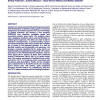Free Online Productivity Tools
i2Speak
i2Symbol
i2OCR
iTex2Img
iWeb2Print
iWeb2Shot
i2Type
iPdf2Split
iPdf2Merge
i2Bopomofo
i2Arabic
i2Style
i2Image
i2PDF
iLatex2Rtf
Sci2ools
109
click to vote
GCB
1998
Springer
1998
Springer
Combining diverse evidence for gene recognition in completely sequenced bacterial genomes
Analysis of a newly sequenced bacterial genome starts with identification of protein-coding genes. Functional assignment of proteins requires the exact knowledge of protein N-termini. We present a new program ORPHEUS that identifies candidate genes and accurately predicts gene starts. The analysis starts with a database similarity search and identification of reliable gene fragments. The latter are used to derive statistical characteristics of protein-coding regions and ribosome-binding sites and to predict the complete set of genes in the analyzed genome. In a test on Bacillus subtilis and Escherichia coli genomes, the program correctly identified 93.3% (resp. 96.3%) of experimentally annotated genes longer than 100 codons described in the PIR-International database, and for these genes 96.3% (83.9%) of starts were predicted exactly. Furthermore, 98.9% (99.1%) of genes longer than 100 codons annotated in GenBank were found, and 92.9% (75.7%) of predicted starts coincided with the fea...
Related Content
| Added | 05 Aug 2010 |
| Updated | 05 Aug 2010 |
| Type | Conference |
| Year | 1998 |
| Where | GCB |
| Authors | Dmitrij Frishman, Andrey A. Mironov, Hans-Werner Mewes, Mikhail S. Gelfand |
Comments (0)

